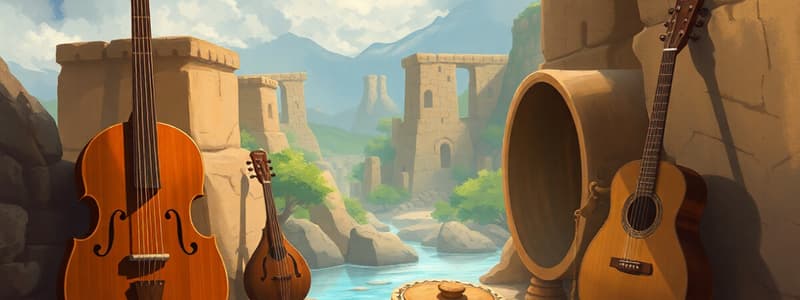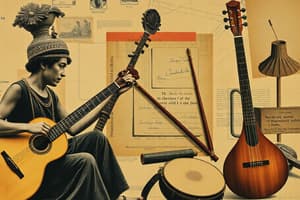Podcast
Questions and Answers
What was the primary purpose of the lyre in ancient Greek and Roman culture?
What was the primary purpose of the lyre in ancient Greek and Roman culture?
- To symbolize harmony (correct)
- To accompany dance performances
- To create percussion sounds
- To serve as a military instrument
What significant musical development is attributed to the ancient Greeks?
What significant musical development is attributed to the ancient Greeks?
- The development of stringed instruments
- The invention of the lyre
- The system of musical notation (correct)
- The creation of orchestral arrangements
Which ancient civilization is known for using the shofar as a musical instrument?
Which ancient civilization is known for using the shofar as a musical instrument?
- Greeks
- Hebrews (correct)
- Egyptians
- Romans
What unique feature characterized the hydraulis, the first keyboard instrument?
What unique feature characterized the hydraulis, the first keyboard instrument?
Which instrument is described in the Vedas and used in ancient Indian music?
Which instrument is described in the Vedas and used in ancient Indian music?
What archaeological site revealed ancient harps that date back approximately 4,000 years?
What archaeological site revealed ancient harps that date back approximately 4,000 years?
What instrument did the Romans develop that was associated with festivals and military use?
What instrument did the Romans develop that was associated with festivals and military use?
Which early musical artifacts were commonly associated with ancient Chinese music?
Which early musical artifacts were commonly associated with ancient Chinese music?
What does the term 'mousike' refer to in ancient Greek culture?
What does the term 'mousike' refer to in ancient Greek culture?
What method did historians use to learn about music from ancient times?
What method did historians use to learn about music from ancient times?
Flashcards
The Lyre
The Lyre
An ancient string instrument symbolizing harmony, used by Greeks and Romans.
Cuneiform Writing
Cuneiform Writing
An early writing system used in Mesopotamia for recording music.
Hydraulis
Hydraulis
The first keyboard instrument powered by water created by Ctesibius.
Veena
Veena
Signup and view all the flashcards
Seikilos Song
Seikilos Song
Signup and view all the flashcards
Cornu
Cornu
Signup and view all the flashcards
Wind Instruments
Wind Instruments
Signup and view all the flashcards
Music in Ancient Mesopotamia
Music in Ancient Mesopotamia
Signup and view all the flashcards
Roman Brass Instruments
Roman Brass Instruments
Signup and view all the flashcards
Hebrew Music Traditions
Hebrew Music Traditions
Signup and view all the flashcards
Study Notes
Ancient World Music
- Ancient music existed in various forms, even though there isn't much written evidence
- Evidence of music comes from pottery designs, paintings on tomb walls, and the discovery of musical instruments
- Music played a role in social celebrations, religious rituals, and entertainment for various cultures
- Egyptians developed early stringed instruments like harps and lutes, as well as flutes and trumpets
- Ancient Greeks had the lyre, a symbolic instrument signifying harmony
- Ancient Chinese used bronze bells, stone slabs, and pottery flutes
- The earliest known written music was found in Ugarit, Syria; it included instructions for tuning a lyre
- Hebrew musicians were spared from captivity by Assyrians and utilized instruments like shofars (ram/antelope horns)
- Ancient Hindus used musical instruments like the veena
- Ancient Greeks developed music theory, defining tones, melody, and harmony through horizontal and vertical lines
- The Seikilos inscription, a preserved Greek music piece, is considered one of the oldest complete musical compositions
- Romans developed brass instruments and the cornu
- The bagpipe was a popular wind instrument, played across various countries
Musical Instruments
- Stringed instruments like the lyre (ancient Greece), harp, and lute (ancient Egypt) were common
- Wind instruments like flutes, trumpets, and the bagpipes were also present
- Percussion instruments such as bells and stone slabs were used
- The veena (a stringed instrument) originated in ancient India
- The shofar (made from a ram horn) was used in ancient Hebrew traditions
Music and Culture
- Music played crucial roles in various ancient cultures, including social celebrations and religious rituals
- Music was connected to the culture and identity, sometimes serving as a symbol of harmony
- Mesopotamian civilizations developed musical systems as seen in the ancient city of Ur
- Some civilizations used music as a form of communication or storytelling.
History of Music
- Evidence of music from ancient times exists through visual records and artefacts
- Written musical notations were present, but not as widespread as in later periods
- Historians used evidence like the Seikilos inscription to study ancient cultures.
- There's evidence that music theory was developing and evolving in various ancient cultures
- Many cultures used music for rituals, and celebrations.
Studying That Suits You
Use AI to generate personalized quizzes and flashcards to suit your learning preferences.



